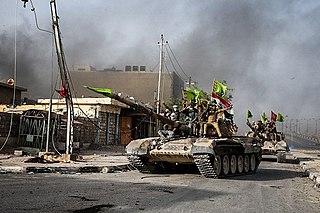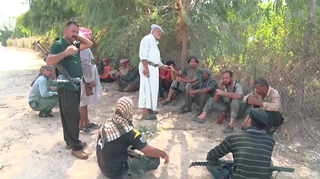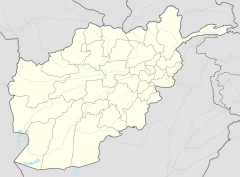
The War in Iraq was an armed conflict between Iraqi forces and their allies and the Islamic State of Iraq and the Levant which began in December 2013 and ended in December 2017. In 2013, the insurgency escalated into a full-scale war with the conquest of Ramadi, Fallujah, Mosul, Tikrit and other towns in the major areas of northern Iraq by the Islamic State of Iraq and the Levant. At its height, ISIL held 56,000 square kilometers of Iraqi territory, containing 4.5 million citizens. This resulted in the forced resignation of Iraqi Prime Minister Nouri al-Maliki, as well as a massive airstrike campaign by the United States and at least a dozen other countries, participation of American and Canadian troops in ground combat operations, a $3.5 billion U.S.-led program to rearm the Iraqi Security Forces, a U.S.-led training program that provided training to nearly 200,000 Iraqi soldiers and police, the participation of Iranian troops including armored and air elements, and military and logistical aid provided to Iraq by Russia.

In response to rapid territorial gains made by the Islamic State of Iraq and the Levant (ISIL) during the first half of 2014, and its universally condemned executions, reported human rights abuses and the fear of further spillovers of the Syrian Civil War, many states began to intervene against it in both the Syrian Civil War and the Iraqi Civil War. Later, there were also minor interventions by some states against ISIL-affiliated groups in Nigeria and Libya.
The following lists events that happened during 2014 in Iraq.

The Islamic State of Iraq and the Levant – Khorasan Province is a branch of the militant Islamist group Islamic State of Iraq and the Levant (ISIL) active in South Asia and Central Asia. Some media sources also use the terms ISK, ISISK, IS-KP, ISIS-K, or Daesh-Khorasan in referring to the group. The Khorasan group's main activity is in the border region of eastern Afghanistan and northern Pakistan, but its area of operations also includes other parts such as Tajikistan, and India where individuals have pledged allegiance to it.
The persecution of Shia Muslims by ISIL involves the systematic mass murder of Shia Muslims by the Islamic extremist group Islamic State of Iraq and the Levant (ISIL), which took place in the territory it formerly controlled in Iraq and Syria.
This is a timeline of events during the War in Iraq in 2016.

On 23 July 2016 a twin bombing occurred in the vicinity of Deh Mazang square in Kabul, capital of Afghanistan, when the #Enlightenment_Movement protesters, mostly from the Hazara ethnic minority, were marching against a decision to bypass their region in the development of the TUTAP mega power project. At least 97 people were killed and 260 injured. The terrorist group Islamic State of Iraq and the Levant has claimed responsibility, however, the same group later on refused it. Some Hazara protestors allege that Afghan president Ashraf Ghani was behind the attack. They believe that Ashraf Ghani government was abetting the terrorists who were responsible for the attack. They also allege that the government officials were preventing the wounded from being shifted to the hospital.

The Battle of Mosul was a major military campaign launched by the Iraqi Government forces with allied militias, the Kurdistan Regional Government, and international forces to retake the city of Mosul from the Islamic State (ISIL), which had seized the city in June 2014. The battle was the world's single largest military operation in nearly 15 years, the largest since the 2003 invasion of Iraq and was considered the toughest urban warfare since World War II.

The Battle of Kirkuk was a battle in the city of Kirkuk in northern Iraq between Iraqi Kurdistan and allies and the Islamic State of Iraq and the Levant. The battle occurred less than a week after the beginning of the Battle of Mosul launched by Iraqi security forces and allies.
The November 2016 Kabul suicide bombing occurred on 21 November 2016. At least 32 people have been killed and above 80 were injured in a suicide bombing at a Kabul Shia mosque "Baqir-ul-Olum". People including women and children were commemorating Arba'een rituals. The Islamic State of Iraq and the Levant – Khorasan Province claimed responsibility for the attack. It was just one in a string of major attacks in Kabul during 2016, and the third to be claimed by ISIL.
On 8 March 2017, the Sardar Daud Khan Military Hospital in Kabul, Afghanistan, was attacked by a group of gunmen, some of them dressed in white hospital robes. Government officials confirmed at least 49 people were killed in the hours-long assault, while 63 others were injured. By March 13 the unconfirmed death toll had surpassed 100, with an unknown number injured. The Islamic State of Iraq and the Levant claimed to have carried out the attack, but officials suspected the Haqqani network instead.
The 2017 Western Nineveh offensive, code-named Operation Muhammad, Prophet of God, was launched by the Iraqi Popular Mobilization Forces (PMF) against the Islamic State of Iraq and the Levant (ISIL) in the western Nineveh province of northern Iraq in late April 2017.

On 31 May 2017, a truck bomb exploded in a crowded intersection in Kabul, Afghanistan, near the German embassy at about 08:25 local time during rush hour, killing over 150 and injuring 413, mostly civilians, and damaging several buildings in the embassy. The attack was the deadliest terror attack to take place in Kabul. The diplomatic quarter—in which the attack took place—is one of the most heavily fortified areas in the city, with 3-meter-tall (10 ft) blast walls, and access requires passing through several checkpoints. The explosion created a crater about 4.5 m (15 ft) wide and 3–4 m (10–13 ft) deep. Afghanistan's intelligence agency NDS claimed that the blast was planned by the Haqqani Network. Although no group has claimed responsibility, the Afghan Taliban are also a suspect but they have denied involvement and condemned the attack.
The Fall of Baiji was a battle that took place in and around Baiji, Iraq in June 2014. It was fought between Islamic State of Iraq and the Levant (ISIL) forces and those of the Iraqi government. Its first stage included clashes in the city from 11 to 18 June. The second stage was fighting over the control of Baiji oil refinery from 18 to 21 June. ISIL captured both the town and the refinery. On 19 June 2014, the Iraqi Army retook the a refinery in a counter-attack. Fighting continued in Baiji until October 2014, when government forces finally established control, which they have maintained since.

On 24 January 2018, militants affiliated with Islamic State of Iraq and the Levant – Khorasan Province launched a bomb and gun attack on a Save the Children office in Jalalabad, a city in the eastern Afghan province of Nangarhar, killing six people and injuring 27.

A suicide bombing occurred on 21 March 2018 around 12:00 PM in Kabul near Kart-e Sakhi, a Shia shrine. At least 33 people were killed with more than 65 wounded in the bombing. The militant group ISIL claimed responsibility for the attack.

The ISIL insurgency in Iraq is an ongoing low-intensity insurgency that began in late 2017 after the Islamic State of Iraq and the Levant (ISIL) lost territorial control in the War in Iraq of 2013 to 2017. ISIL and allied White Flags fought the Iraqi military and allied paramilitary forces.










